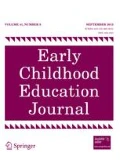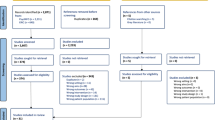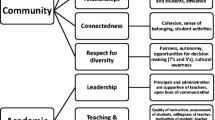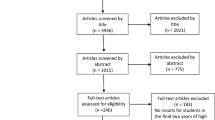Abstract
Teaching has been identified as the most stressful profession in the human service industry (Greenberg in Teacher stress and heal the effects on teachers, students, and schools, Edna Bennett Pierce Prevention Research Center, Pennsylvania State University, University Park, 2016). Elevated teacher stress not only affects the teacher’s well-being and likelihood of burnout, but also the classroom climate of young children. The purpose of the present study was to assess whether mindfulness practices can increase positive classroom climate and decrease perceived stress in early childhood teachers. Participating teachers were selected based on results of the Perceived Stress Scale (PSS, Cohen in Journal of Health and Social Behavior, 24:285–396, 1983). Data were collected on the positive and negative climate objectives from the Classroom Assessment Scoring System (CLASS; Pianta in Classroom assessment scoring system (CLASS) manual, pre-K, Paul H. Brookes Pub. Co., Baltimore, 2008), which were operationally defined. The Mindfulness Practices Intervention included yoga poses, intentional breathing, and guided mediation (Harris in Mindfulness 7:143–154, 2015), which were implemented within the school day during arrival, mid-morning, lunch, mid-afternoon, and after work in the evening. Perceived Stress Scale scores decreased for two of the participating teachers; all three teachers’ increased positive climate and decreased negative climate. Results of the current study suggest that this low-cost, low labor-intensive intervention was effective in improving classroom conditions for both teachers and young children.

Similar content being viewed by others
References
Arens, A. K., & Morin, A. J. S. (2016). Relations between teachers’ emotional exhaustion and students’ educational outcomes. Journal of Educational Psychology,108(6), 800–813. https://doi.org/10.1037/edu0000105.
Beltman, S., Mansfield, C., & Price, A. (2011). Thriving not just surviving: A review of research on teacher resilience. Educational Research Review,6(3), 185–207.
Beshai, S., McAlpine, L., Weare, K., & Kuyken, W. (2016). A non-randomized feasibility trial assessing the efficacy of a mindfulness-based intervention for teachers to reduce stress and improve well-being. Mindfulness,7(1), 198–208.
Breeman, L. D., Wubbels, T., van Lier, P. A. C., Verhulst, F. C., van der Ende, J., Maras, A., et al. (2015). Teacher characteristics, social classroom relationships, and children’s social, emotional, and behavioral classroom adjustment in special education. Journal of School Psychology,53(1), 87–103.
Castle, C. (2012). Early childhood teacher research: From questions to results. New York: Routledge.
Chu, P., Gotink, R. A., Yeh, G. Y., Goldie, S. J., & Hunink, M. (2016). The effectiveness of yoga in modifying risk factors for cardiovascular disease and metabolic syndrome: A systematic review and meta-analysis of randomized controlled trials. European Journal of Preventive Cardiology,23(3), 291–307.
Cohen, J. (2012). Creating a positive school climate: A foundation for resilience. Handbook of Resilience in Children. https://doi.org/10.1007/978-1-4614-3661-4_24.
Cohen, S., Kamark, T., & Mermelstein, R. (1983). A global measure of perceived stress. Journal of Health and Social Behavior, 24(4), 285–396. Retrieved from http://www.psy.cmu.edu/~scohen/globalmeas83.pdf
Cook, D. (1962). The Hawthorne effect in educational research. The Phi Delta Kappan, 44(3), 116–122. Retrieved from http://www.jstor.org.libezp.lib.lsu.edu/stable/20342865
Davis, D. M., & Hayes, J. A. (2011). What are the benefits of mindfulness? A practice review of psychotherapy-related research. Psychotherapy,48(2), 198–208. https://doi.org/10.1037/a0022062.
Escamilla, I. M., & Meier, D. (2017). The promise of teacher inquiry and reflection: Early childhood teachers as change agents. Studying Teacher Education. https://doi.org/10.1080/17425964.2017.1408463.
Flook, L., Goldberg, S. B., Pinger, L., Bonus, K., & Davidson, R. J. (2013). Mindfulness for teachers: A pilot study to assess effects on stress, burnout, and teaching efficacy. Mind, Brain, and Education,7, 182–195.
Frank, J. L., Reibel, D., Broderick, P., Cantrell, T., & Metz, S. (2013). The effectiveness of mindfulness-based stress reduction on educator stress and well-being: Results from a pilot study. Mindfulness,6(2), 208–216. https://doi.org/10.1007/s12671-013-0246-2.
Gallup (2014). State of American’s schools: The path to winning again in education. Gallup. Retrieved from file:///C:/Users/cdicar2/Downloads/Gallup%20Report%20--%20State%20Of%20Americas%20Schools.pdf
Greenberg, M. T., Brown, J. L., & Abenavoli, R. M. (2016). Teacher stress and health effects on teachers, students, and schools. University Park: Edna Bennett Pierce Prevention Research Center, Pennsylvania State University.
Harris, A. R., Jennings, P. A., Katz, D. A., Abenavoli, R. M., & Greenberg, M. T. (2015). Promoting stress management and wellbeing in educators: Feasibility and efficacy of a school-based yoga and mindfulness intervention. Mindfulness,7(1), 143–154. https://doi.org/10.1007/s12671-015-0451-2.
Hölzel, B. K., Lazar, S. W., Grad, T., Schuman-Olivier, Z., Vago, D. R., & Ott, U. (2011). How does mindfulness meditation work? Proposing mechanisms of action from a conceptual and neural perspective. Perspectives on Psychological Science,6(6), 537–559. https://doi.org/10.1177/1745691611419671.
Hwang, Y., Bartlett, B., Greben, M., & Hand, K. (2017). A systematic review of mindfulness interventions for in-service teachers: A tool to enhance teacher wellbeing and performance. Teaching and Teacher Education,64, 26–42. https://doi.org/10.1016/j.tate.2017.01.015.
Jennings, P. A., Frank, J. L., Snowberg, K. E., Coccia, M. A., & Greenberg, M. T. (2013). Improving classroom learning environments by cultivating awareness and resilience in education (CARE) Results of a randomized controlled trial. School Psychology Quarterly.,28(4), 374–390.
Jennings, P. A., & Greenberg, M. T. (2009). The prosocial classroom: Teacher social and emotional competence in relation to student and classroom outcomes. Review of Educational Research,79, 491–525. https://doi.org/10.3102/0034654308325693.
Johnson, S., Cooper, C., Cartwright, S., Donald, I., Taylor, P., & Millet, C. (2005). The experience of work-related stress across occupations. Journal of Managerial Psychology,20(2), 178–187.
Kahn, W. A. (1993). Caring for the caregivers: Patterns of organizational caregiving. Administrative Science Quarterly,38(4), 539–564.
Kazdin, A. E. (2011). Single-case research design: Methods for clinical and applied settings (2nd ed.). New York: Oxford University Press.
Kidger, J., Gunnell, D., Biddle, L., Campbell, R., & Donovan, J. (2009). Part and parcel of teaching? Secondary school staff’s views on supporting student emotional health and well-being. British Educational Research Journal,36(6), 919–935. https://doi.org/10.1080/01411920903249308.
Kratochwill, T. R., Hitchcock, J., Horner, R. H., Levin, J. R., Odom, S. L., Rindskopf, D. M. & Shadish, W. R. (2010). Single-case designs technical documentation. Retrieved from What Works Clearinghouse website: https://ies.ed.gov/ncee/wwc/Document/229
Merritt, E. G., Wanless, S. B., Rimm-Kaufman, S., Cameron, C. E., & Peugh, J. L. (2012). The contribution of teachers’ emotional support to children’s social behaviors and self-regulatory skills in first grade. School Psychology Review,41(2), 141–159.
Moore, S. E., Perry, A. R., Bledsoe, L. K., & Robinson, M. A. (2011). Social work students and self-care: A model assignment for teachers. Journal of Social Work Education,47(3), 545–553.
Osher, D., Cantor, P., Berg, J., Steyer, L., & Rose, T. (2018). Drivers of human development: How relationships and context shape learning and development. Applied Developmental Science. https://doi.org/10.1080/10888691.2017.1398650.
Pianta, R. C., La Paro, K. M., & Hamre, B. K. (2008). Classroom assessment scoring system (CLASS) manual, pre-K. Baltimore, MD: Paul H. Brookes Pub. Co.
Roeser, R. W., Schonert-Reichl, K. A., Jha, A., Cullen, M., Wallace, L., Wilensky, R., et al. (2013). Mindfulness training and reductions in teacher stress and burnout: Results from two randomized, waitlist-control field trials. Journal of Educational Psychology,105(3), 787–804. https://doi.org/10.1037/a0032093.
Sautelle, E., Bowles, T., Hattie, J., & Arifin, D. N. (2015). Personality, resilience, self-regulation and cognitive ability relevant to teacher selection. Australian Journal of Teacher Education. https://doi.org/10.14221/ajte.2015v40n4.4.
Schonert-Reichl, K. (2017). Social and emotional learning and teachers. The Future of Children, 27(1), 137–155. Retrieved from http://www.jstor.org.libezp.lib.lsu.edu/stable/44219025
Schonert-Reichl, K. A. (2019). Advancements in the landscape of social and emotional learning and emerging topics on the horizon. Educational Psychologist,54(3), 222–232. https://doi.org/10.1080/00461520.2019.1633925.
Segal, Z. [Mindful]. (2016, June 8). Three-minute breathing space [Video File]. Retrieved from https://www.youtube.com/watch?v=amX1IuYFv8A
Skinner, E.A., & Beers, J. (2016). Mindfulness and teachers’ coping in the classroom: A developmental model of teacher stress, coping, and everyday resilience. In K. Schonert-Reichl & R.W. Roeser (co-eds), Handbook on mindfulness in education: Emerging theory, research, and programs. Springer, Berlin. https://www.pdx.edu/psy/sites/www.pdx.edu.psy/files/HME%20Skinner%20%26%20Beers%2022Sept2014.pdf
Taylor, C., Harrison, J., Haimovitz, K., Oberle, E., Thomson, K., Schonert-Reichl, K., et al. (2016). Examining ways that a mindfulness-based intervention reduces stress in public school teachers: a mixed-methods study. Mindfulness,7(6), 1449–1449. https://doi.org/10.1007/s12671-016-0620-y.
Travers, C. J., & Cooper, C. L. (1993). Mental health, job satisfaction and occupational stress among UK teachers. Work and Stress,7(3), 203–219.
Winston, D. [UCLA Health]. (2014, May 27). Breathing meditation: UCLA mindfulness awareness research center [Video File]. Retrieved from http://marc.ucla.edu/video-gallery
GoNoodle. From mindless to mindful [Video File]. Retrieved from https://app.gonoodle.com/channels/flow/from-mindfulness-to-mindful?s=Search&t=mindless%20to%20mindful
Young, K. M., & Cooper, C. L. (1999). Change in stress outcomes following an industrial dispute in the ambulance service: a longitudinal study. Health Services Management Review,12, 51–62.
Author information
Authors and Affiliations
Corresponding author
Additional information
Publisher's Note
Springer Nature remains neutral with regard to jurisdictional claims in published maps and institutional affiliations.
Rights and permissions
About this article
Cite this article
DiCarlo, C.F., Meaux, A.B. & LaBiche, E.H. Exploring Mindfulness for Perceived Teacher Stress and Classroom Climate. Early Childhood Educ J 48, 485–496 (2020). https://doi.org/10.1007/s10643-019-01015-6
Published:
Issue Date:
DOI: https://doi.org/10.1007/s10643-019-01015-6




